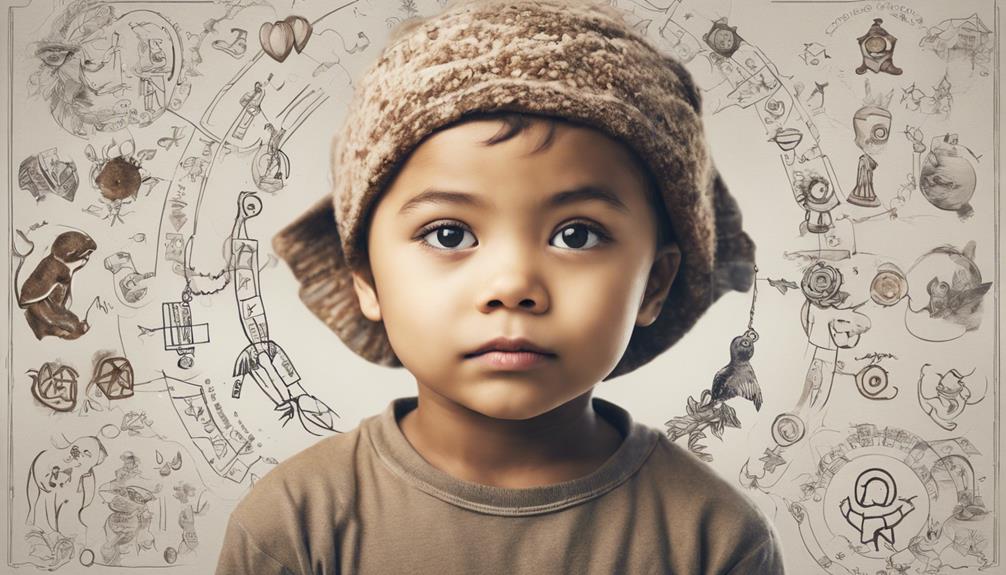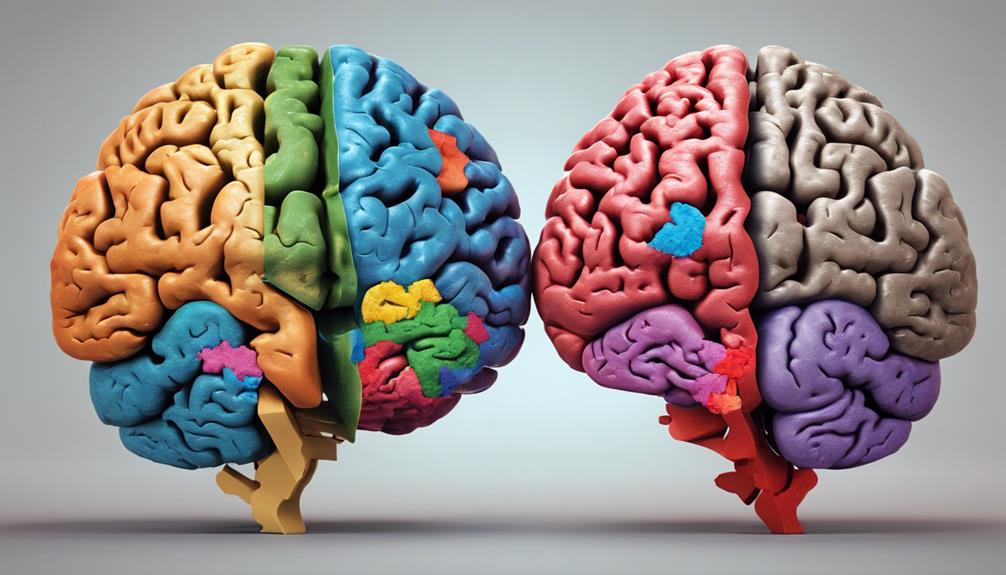As we observe a child mastering new physical skills like walking or grasping objects, we begin to question: what truly defines the five domains of the whole child?
Each domain plays a unique role in shaping a child's development, but how do they interconnect and influence one another?
Let's explore the intricate web of connections between these domains and uncover the essential elements that contribute to a child's holistic growth and well-being.
Key Takeaways
- Physical development involves body growth and skill refinement for overall well-being.
- Cognitive development focuses on mental processes, problem-solving, and critical thinking abilities.
- Social development nurtures relationships, social skills, and empathy through interactions and positive reinforcement.
- Emotional development is crucial for understanding, expressing, and regulating emotions in social contexts.
Physical Development Domain
We observe that the Physical Development Domain encompasses the intricate growth and skill refinement of a child's body, including the brain, muscles, and senses. This domain is important as it lays the foundation for a child's overall physical well-being. From the development of gross motor skills like crawling, walking, running, and jumping to the fine motor skills necessary for tasks such as writing, drawing, and manipulating small objects, every skill acquired is a building block for future abilities. Bodily awareness, muscle development, coordination, and sensory development are all integral components of this domain.
Ensuring physical safety is paramount during this phase of growth. Supporting infants during tummy time and providing safe spaces for exploration and play aids in muscle strengthening and coordination. Offering toys that encourage grip strength and hand-eye coordination further enhances fine motor skill development. By nurturing these skills early on, we set the stage for a child's physical confidence and competence in their environment.
Cognitive Development Domain

Moving from the Physical Development Domain to the Cognitive Development Domain, we shift our focus to mental processes such as problem-solving, memory, and understanding. Cognitive development in a child is a complex process that involves Jean Piaget's stages of development, which include sensorimotor, preoperational, concrete operational, and formal operational stages. These stages outline how children progress in their thinking abilities from infancy to adolescence.
Children's cognitive development is influenced by a combination of genetics, environment, and experiences. As they grow, children develop cognitive skills through exploration and interaction with their surroundings. This active engagement with the world around them helps shape their ability to reason, think critically, and solve problems.
Understanding cognitive development is vital as it forms the basis for academic success and lifelong learning. By nurturing a child's cognitive abilities, we support their intellectual growth and prepare them for the challenges they'll face in education and beyond. It's through cognitive development that children learn to make sense of the world and adapt to new information and experiences.
Social Development Domain

Focusing on the Social Development Domain, this aspect of child development centers on fostering relationships, interpreting social cues, and honing essential social skills.
- Encouraging interactions like babbling and peek-a-boo helps infants in social development.
- Model respectful behavior and encourage group play to enhance social skills in toddlers.
- Playdates and positive reinforcement support social development in young children.
- Teaching cooperation, empathy, and facilitating unstructured play nurtures social development in preschoolers.
These activities lay the foundation for healthy social interactions throughout a child's life. Infants start by babbling, learning to engage with others through simple interactions like peek-a-boo. As toddlers, they begin exploring group play, understanding the dynamics of social relationships. For young children, playdates and positive reinforcement provide opportunities to practice important social skills. Preschoolers explore empathy, cooperation, and unstructured play, essential for developing meaningful connections with peers. By focusing on these key areas, caregivers and educators can help children navigate the complex world of social interactions with confidence and empathy.
Emotional Development Domain

Exploring the Emotional Development Domain involves understanding, expressing, and effectively managing emotions in various social interactions. Emotional development is essential for individuals as it encompasses the ability to recognize, interpret, and respond to one's own emotions and those of others.
By regulating emotions appropriately, individuals can navigate social interactions more skillfully, leading to improved relationships and mental well-being. Nurturing environments play a pivotal role in supporting emotional development, fostering a sense of security where feelings are acknowledged and validated.
Encouraging the development of emotional intelligence from a young age can greatly benefit children, equipping them with the tools to handle challenges, build resilience, and enhance their overall quality of life. As a result, prioritizing emotional development not only enhances individual well-being but also contributes to creating a more empathetic and harmonious society.
Language Development Domain

Acquiring language skills is a fundamental aspect of early childhood development, encompassing the mastery of vocabulary, grammar, and communication skills essential for effective interaction. In the journey of language development, children progress through various stages, starting from babbling to holophrastic speech, then telegraphic speech, and finally constructing full sentences. Exposure to language-rich environments plays a pivotal role in nurturing children's linguistic abilities. Toddlers, around the age of 2, typically begin using telegraphic speech, where they string together short, meaningful phrases to convey their thoughts.
- Language development involves acquiring vocabulary, grammar, and communication skills essential for effective communication.
- Children progress through stages like babbling, holophrastic, telegraphic speech, and full sentences as they develop language skills.
- Exposure to language-rich environments is essential for promoting language development in children.
- By age 2, toddlers typically start using telegraphic speech with short, meaningful phrases.
- Maturation of verbal communication skills varies among individuals, influenced by environmental factors and interactions.
Frequently Asked Questions
What Are the 5 Domains of Child Development?
I comprehend the significance of the 5 domains of child development: physical, cognitive, communicative, socioemotional, and adaptive. Each area contributes uniquely to a child's growth and well-being, forming the foundation for their holistic development.
What Are the 5 Domains of the Whole Child?
Understanding the 5 domains of the whole child – physical, cognitive, communicative, socioemotional, and adaptive – is crucial for nurturing holistic growth. Each domain influences a child's abilities and readiness for life experiences.
What Are the 5 Selves of the Whole Child?
I comprehend the 5 selves of the whole child as physical, cognitive, social, emotional, and language development. They encompass motor skills, mental processing, social cues, and communication skills. Each domain plays an essential role in holistic child growth.
What Is the Definition of Domain in Child Development?
In child development, a domain signifies a specific facet of a child's growth and well-being. Understanding and nurturing these domains – physical, cognitive, communicative, socioemotional, and adaptive – are essential for fostering the holistic development of the whole child.
Conclusion
To sum up, the five domains of the whole child are like the five pillars holding up a sturdy fortress of development.
From physical prowess to cognitive acrobatics, from emotional intelligence to linguistic finesse, these domains work together in perfect harmony to shape a well-rounded individual.
So, next time you see a child mastering a new skill or managing social interactions with ease, remember – it's all thanks to the magical synergy of these five domains at play!
Cheers to holistic growth and endless possibilities!










